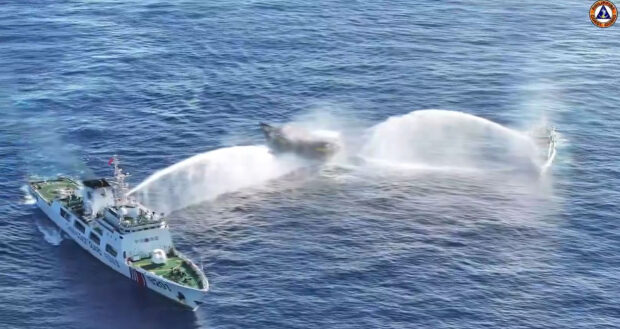
A RED LINE To slip past water cannon attacks and blocking maneuvers of Chinese ships, last seen during the incident in Ayungin Shoal on Tuesday, the Philippine military will focus on speed and maneuverability in its future missions to its outpost there, the BRP Sierra Madre, according to Vice Adm. Alberto Carlos, chief of the AFP Western Command. — VIDEO GRAB FROM PCG
MANILA, Philippines — The Philippine Coast Guard (PCG) will provide “perimeter security” to military troops participating in this year’s “Balikatan” (shoulder-to-shoulder) exercises within the Philippine and international waters, in case “unauthorized vessels” approach the area, according to its spokesperson Rear Admiral Armand Balilo.
Although PCG will deploy six vessels — four multi-role response vessels and two larger patrol vessels — during the war games between the Philippines and the United States (US), Balilo said they will act on “limited capacity” during the multilateral maritime exercise.
“Hindi kami lahat magpa-participate dun sa maritime exercise, but pina-plantsa pa kung ano yung particular areas na kung saan kami papasok,” Balilo told reporters in a press conference on Monday after the opening ceremony of the Balikatan’s 39th iteration in Camp Aguinaldo, Quezon City.
(Not all of us will participate in the maritime exercise, but they are still finalizing which areas we will enter.)
“But mainly the Philippine Coast Guard will provide perimeter security for the exercise kung may lalapit o magtatangkang unauthorized vessels na lumapit, we’ll be the one who will be acting as security,” he pointed out.
(But PCG will mainly provide perimeter security for the exercise if there will be vessels that will be approaching or unauthorized vessels that will attempt to approach them.)
The PCG official said this would be one of their roles, adding that they are also part of the search and rescue exercise set to be conducted in Northern Luzon.
Philippine Coast Guard spokesperson Rear Admiral Armand Balilo (File photo)
Earlier, Balilo said this would be the first time PCG will participate in “joint inter-operability exercises” with the Philippine Navy and their counterparts from the United States, Australia and France from April 22 to May 10.
PCG used to be just not as an observer.
The annual war games, officially opened by AFP chief Gen. Romeo Brawner Jr. earlier Monday, will be conducted in Northern Luzon and Palawan with approximately 16,000 military personnel, including contingents from the Australian Defense Force and the French Navy.
Of the 16,000 participants, around 5,000 are AFP personnel, mainly from the Northern Luzon Command and Western Command, while the 11,000 are US military personnel consisting of 3,700 marines, 1,200 soldiers, 4,000 Navy personnel, 400 airmen and Air National Guardsmen, and 750 special operations forces, among others.